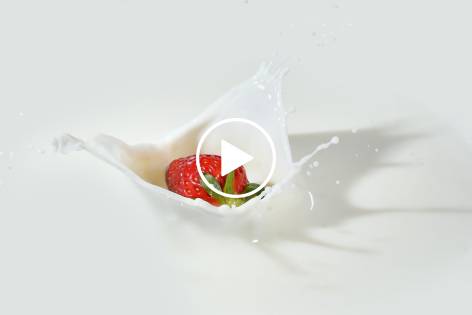
LMU 154 – The Milky Way to Breast Health: Rethinking Dairy Consumption
Source: International Journal of Epidemiology (2020)
Lifestyle Medicine Update (Mar 1, 2020)
Introduction:
The dietary landscape is ever-evolving, and it’s often challenging to separate fact from fiction, especially when it comes to our health. For years, dairy milk has held a prime spot in the Western diet, touted for its calcium content and nutritional benefits. However, a groundbreaking study from Loma Linda University, published in the International Journal of Epidemiology in February 2020, has shaken the foundations of this age-old belief. This research has brought to light a startling revelation: dairy milk consumption may be linked to an increased risk of breast cancer in women, with the risk escalating by as much as 80%, depending on the quantity consumed.
The Study: Unveiling the Dairy-Breast Cancer Connection
This extensive study delved into the dietary habits of nearly 53,000 North American women, all initially free of cancer, over an eight-year period. The research considered an array of factors, including demographics, family history of breast cancer, physical activity, alcohol consumption, medication use, breast cancer screening, and reproductive and gynecological history. By the end of the study, a total of 1,057 new breast cancer cases had emerged, casting a spotlight on the potential role of dairy milk in this concerning statistic.
Dairy Milk and the Breast Cancer Risk
The study’s findings painted a concerning picture. Those who regularly consumed dairy milk faced a significantly higher risk of breast cancer. Even as little as a quarter to a third of a cup of dairy milk per day was associated with a 30% increased risk of breast cancer. For those who indulged in up to one cup daily, the risk surged to 50%, and for those drinking two to three cups daily, the risk soared to a staggering 70% to 80%. Intriguingly, the type of milk—be it high-fat, low-fat, or non-fat—did not alter this disconcerting pattern. However, yogurt and cheese consumption appeared to have no discernible impact on breast cancer risk.
Embracing Dairy Alternatives: A Safer Choice?
In light of these findings, it’s worth considering alternatives to dairy milk. The study posits that dairy-alternate milk, such as soymilk, almond milk, or oat milk, could offer a safer choice for those concerned about breast cancer risk. Intriguingly, this aligns with the growing body of evidence that suggests vegans, who eschew dairy products entirely, may experience lower rates of breast cancer than non-vegetarians.
The IGF-1 Connection: Unravelling the Mystery
But what exactly is it about dairy milk that might contribute to breast cancer? One compelling theory centers around insulin-like growth factor-1 (IGF-1), a hormone that plays a crucial role in promoting certain cancers. Animals often receive growth hormone treatment to boost milk production, resulting in elevated IGF-1 levels in their blood. When humans consume milk or meat from these animals, they also ingest this hormone, potentially acting as a catalyst for cellular division and genetic mutations, ultimately increasing the risk of breast cancer.
A Changing Landscape: The Future of Dairy Farming and Consumption
These findings pose profound implications for dairy farming practices and dietary recommendations. As research mounts, the use of growth hormones in dairy farming and the public’s perception of milk consumption may undergo transformation. In this changing landscape, low-fat Greek yogurt emerges as a compelling dairy option, and dairy-alternate milks like soymilk, almond milk, or oat milk could become preferred choices, especially for those concerned about breast cancer risk.
Conclusion: Navigating the Dairy Dilemma
The journey into the world of dairy and its potential link to breast cancer is both enlightening and cautionary. As we continue to unravel the complexities of our diets and their impact on our health, it’s essential to approach such findings with an open mind. While more research is needed to solidify these connections, the evidence thus far invites us to explore dairy alternatives and consider a diversified approach to our nutritional choices.
References:
- Main Reference: Synnove Knutsen, Rawiwan Sirirat, Andrew Mashchak, Michael Orlich, Karen Jaceldo-Siegl, Gary E Fraser. Dairy, soy, and risk of breast cancer: those confounded milk. International Journal of Epidemiology, 2020. [Read the full study here](https://academic.oup.com/ije/advance-article-abstract/doi/10.1093/ije/dyaa007/5743492?redirectedFrom=fulltext).
- [ScienceDaily – Dairy milk consumption may increase breast cancer risk](https://www.sciencedaily.com/releases/2020/02/200225101323.htm).
- [Global News – Canadian dairy farmers will no longer use growth hormones under new USMCA deal](https://globalnews.ca/news/4533226/canadians-growth-hormones-dairy-usmca/)
Dr. Meschino

Dr. James Meschino
ABOUT THE AUTHOR
Dr. James Meschino, DC, MS, ROHP, is an educator, author, and researcher having lectured to thousands of healthcare professionals across North America. He holds a Master’s Degree in Science with specialties in human nutrition and biology and is recognized as an expert in the field of nutrition, anti-aging, fitness, and wellness as well as the author of numerous books.


